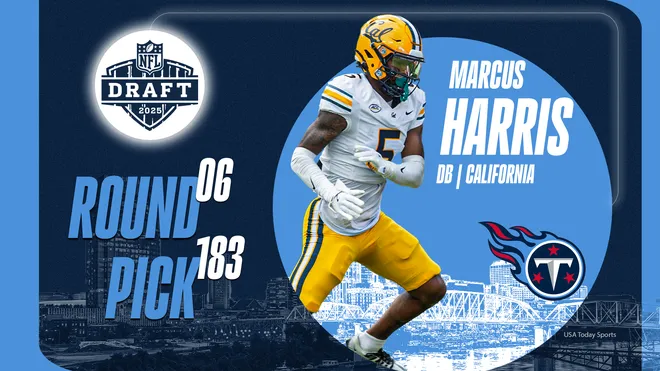Marcus Harris, a disruptive and technically polished defensive tackle out of Auburn, was drafted by the Tennessee Titans in the 2024 NFL Draft, signaling a clear intent by the franchise to continue rebuilding its defensive front with high-motor, gap-shooting linemen. While he may not have the headline appeal of a first-round pick, Harris offers the kind of production, leadership, and scheme versatility that can quietly turn into a long-term contributor in the NFL.
Harris stands at 6-foot-2 and weighs around 295 pounds, with a compact frame that gives him natural leverage against taller offensive linemen. That build, coupled with his elite hand usage and football IQ, makes him a menace on the interior, particularly in 3-technique alignments where he can fire off the ball and disrupt plays before they fully develop. What separates Harris from many of his peers is his get-off — his first step is explosive, allowing him to win early in reps and collapse the pocket or blow up run plays before they gain momentum. Though not a prototypical space-eater, his penetration skills fit perfectly in an aggressive, attacking front like the one the Titans are assembling under their new defensive leadership.
During his final collegiate season, Harris led Auburn in tackles for loss and sacks, a rare feat for a defensive lineman and a testament to his consistent impact. He registered 11 tackles for loss and 7 sacks in 2023, thriving in both even and odd fronts. Whether lined up as a 3-tech in a 4-3 or as an end in a 3-4 front, Harris demonstrated the versatility that NFL coaches crave. He isn’t just a pocket pusher — he’s a technician who wins with timing, leverage, and relentless effort. His hips are fluid, and he possesses the lateral quickness to loop on stunts or chase plays down the line.
Still, his game isn’t without limitations. Harris lacks the ideal arm length for an NFL interior lineman, which can be problematic when trying to disengage from longer guards and centers. At times, he can get swallowed up if his initial move is neutralized, and he doesn’t quite have the raw power to anchor consistently against double teams. However, these deficiencies are largely mitigated by his instincts and quick processing. He reads blocking schemes well and often anticipates where the play is going before it starts. His football intelligence and preparation give him an edge that can’t be measured purely through measurables or combine metrics.
In pre-draft evaluations, Harris stood out in interviews and meetings with teams, noted for his maturity and love of the game. Coaches raved about his work ethic, his locker room presence, and his willingness to do the dirty work. He’s not someone who demands the spotlight — but he’s the type of player who earns it by consistently doing his job and elevating those around him. His motor runs hot, and that effort pops on tape from the first snap to the final whistle. Whether it was battling in the trenches against Georgia or making critical stops versus Alabama, Harris consistently delivered high-level play against elite competition.
Athletically, Harris tested in the middle tier for his position. His 40-yard dash, vertical jump, and bench press reps were solid but not eye-popping. What those numbers don’t reflect is his play speed, which shows up repeatedly on film. He’s quick to diagnose and attack, and while he may not chase down quarterbacks 20 yards downfield, he consistently disrupts the timing and rhythm of offenses. That’s where his value lies — not as a stat-sheet stuffer but as a consistent thorn in the side of both run and pass blocking schemes.
The Titans’ decision to draft Harris likely stemmed from a desire to bolster depth on the interior line while adding a player who can immediately compete for rotational reps. Tennessee’s defensive identity has long been tied to toughness and grit, and Harris fits that mold perfectly. He’s not flashy, but he’s dependable, and those types of players often outlast higher-drafted peers who struggle with consistency. In early camp evaluations, Harris is expected to contribute on early downs and in certain pass-rush packages, especially when matched up against guards he can out-quick.
Beyond the X’s and O’s, Harris also brings intangibles that NFL teams prize. He was a leader at Auburn, often holding teammates accountable and bringing energy in meetings and practices. That leadership, paired with his blue-collar mentality, makes him a potential culture-setter in a young Titans locker room looking for steady voices as they navigate a new era under head coach Brian Callahan. Players like Harris, who excel in multiple roles and do so without complaint, often serve as glue guys — the kinds of veterans that future draft picks look up to and model their habits after.
From a developmental perspective, Harris still has room to grow. Improving his lower-body strength will help him hold up better in base packages against power-running teams, and refining his counter moves as a pass rusher will allow him to be more dangerous when his initial plan fails. Right now, he wins a lot with his first move, but adding a refined secondary move — whether it’s a club-rip or spin — would make him a more complete interior threat.
There’s also a strong chance Harris sees situational usage as a rookie, especially in third-and-medium or second-and-long packages where his quickness can be most effective. Titans defensive coordinator Dennard Wilson, known for dialing up pressure from various angles, will likely use Harris as a chess piece to overload weak links on offensive lines. Paired with veterans like Jeffery Simmons or Denico Autry, Harris could benefit greatly from 1-on-1 matchups inside, using his quick hands and low pad level to attack gaps and flush quarterbacks from the pocket.
Long-term, Harris projects as a reliable rotational lineman with upside to grow into a starter, particularly in a scheme that values movement and penetration over sheer size. His skill set isn’t universal — he wouldn’t fit as cleanly into a two-gapping, read-and-react front — but in Tennessee’s fast, attacking defense, he’s almost tailor-made for a disruptive role. If he continues to hone his craft and stays healthy, there’s no reason Harris can’t become a mainstay in the Titans’ defensive line rotation for years to come.
In sum, the Titans didn’t just select a productive SEC lineman — they brought in a culture fit, a technician, and a player who plays with the kind of fire that resonates in the NFL trenches. Marcus Harris may have flown under the radar compared to flashier prospects, but make no mistake: he has all the makings of a steal. His blend of technique, motor, and experience makes him a valuable addition to a Tennessee defense that prides itself on physicality and precision. As he transitions into the pros, don’t be surprised if Harris becomes one of the more impactful late-round picks from the 2024 class — not because of highlight-reel plays, but because he shows up, every down, ready to do the job. That’s the kind of player who sticks.



